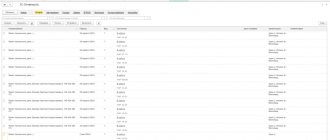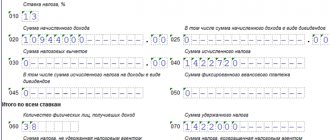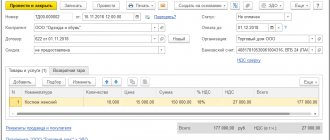Who is checked first?
Quite often, the director learns that the company is in the federal information resource of tax authorities “Risks” from the counterparty, who himself carefully checks the partner or learned about this from his tax audit report, or received a request to provide documents.
The “Risks” database includes companies that, in the opinion of tax authorities, may not pay taxes. Only a tax inspector can find out whether your company is in this database. The database is closed to public access. Order of the Federal Tax Service of Russia dated June 24, 2011 No. MMV-8-2/42dsp@. The risk of getting into this database is higher if your turnover is more than 100 million rubles, one of your partners has not paid taxes and is being audited, the company is registered at a mass address.
In general, tax authorities use many different databases during on-site audits. For example, “One-day”, “Mass leader”, “Average headcount” and so on. Letter of the Federal Tax Service of Russia dated July 25, 2013 No. AS-4-2/13622.
Master-slave
The psychological mechanism of this phenomenon is quite simple: in every situation of social interaction (such as an on-site inspection) there is a leader and there is a follower. You should by all means and means become a leader and not a follower. If access to communication with you is difficult on your initiative, your rules and against the will of your opponents, then you are the leader, and the inspectors become followers. After all, they obeyed your will! And on a subconscious level they feel more insecure. Arrogance and disdain disappear. In addition, inspectors often count on a state of shock during communication, panic and fear in the eyes of those being inspected. Realizing that this factor is missing in this case, they lose control over the situation. And it is important to maintain this psychological advantage until the end of the test.
It is recommended to set aside a separate office for the meeting room with the simplest necessary furniture, no flowers or other decor, and no telephones. This is a place intended not only for business meetings. This is where it makes sense to place inspectors during long-term inspections. It is absolutely wrong to allocate places for inspectors, say, in the accounting department. Within a short time, informal relationships develop between your staff and officials, which can lead to information leakage. It is necessary to organize the work of inspectors so that they do not leave the meeting room, bringing them the necessary documents for study. There is only one ideal movement pattern for both inspectors and other office guests: entrance-security-secretary-meeting room-and back.
During the inspection, employees must limit discussion of work issues outside of their workplaces: in corridors, smoking rooms, and canteens. Inspectors collect information, incl. and from such “accidentally overheard conversations.”
What documents can tax authorities require during an on-site inspection?
Tax inspectors try to obtain as many documents as possible. There is no clear list of documents that they may request. On the one hand, this happens because tax specialists are not familiar with the various specifics of businesses. There is a large list of types and types of documents, and the inspector asks for absolutely everything. On the other hand, inspectors often ask for documents without knowing what they need. From the category: give everything, we'll see there.
In most cases, a 2-3 page requirement with a list of documents that the company must prepare for the inspector is unlawful. The scope of the requested documents depends on the type of inspection.
As part of a desk inspection, the inspector has the right to request documents if:
- in the VAT return, the organization declared the tax to be reimbursed from the budget (clause 8 of Article 88 of the Tax Code of the Russian Federation);
- to reduce tax or increase losses two years after the deadline for submitting the initial declaration (clause 8.3 of Article 88 of the Tax Code of the Russian Federation);
- Tax authorities found inconsistencies or contradictions in the VAT return (clause 8.1 of Article 88 of the Tax Code of the Russian Federation);
- the company took advantage of the tax benefit (clause 6 of article 88 of the Tax Code of the Russian Federation).
EXAMPLE FROM JUDICIAL PRACTICE
In the resolution of the Ninth Arbitration Court of Appeal dated March 4, 2016 No. 09AP-2367/2016, the court came to the conclusion that there were connections with. According to the bank statement for the current accounts of Primera LLC, it was established that Primera LLC made transfers for transport services to organizations that have the characteristics (no labor personnel, managers are “mass”), namely: Prostor LLC, Prostor LLC Expoline", LLC "Doris". From the Internal Affairs Directorate for the Central Administrative District of the Main Directorate of the Ministry of Internal Affairs of Russia for the city of Moscow, the tax authority received explanations from the General Director of Investproject LLC S.V. Klyueva, who reported that she was not involved in the activities of Investproject LLC, this organization was not familiar to her, in the period 2010–2012 . she worked at the Perekrestok store as a salesperson, and also indicated that in 2008 she lost her passport. In this regard, she wrote a statement to the internal affairs authorities. Some time later I found my passport in the mailbox. S.V. Klyueva also explained that she had never conducted any activities on behalf of legal entities.
GOOD TO KNOW
An important criterion for determining the feasibility of including a taxpayer in the on-site tax audit plan is profitability. It is clear that the higher this profitability indicator, the more effective the organization’s activities. The obtained data are compared with the average indicators for the taxpayer’s main activity. A significant downward deviation is considered to be 10% from the industry average.
A similar connection with was identified in the resolution of the Ninth Arbitration Court of Appeal dated March 20, 2014 No. 09AP-5428/14. The tax authority indicates that the taxpayer and CJSC "UK ZHKH Monolit" are interdependent entities, and the relationship between them was built with the aim of obtaining unjustified tax benefits and withdrawing funds through. At the same time, only two grounds are indicated for recognizing the taxpayer as interdependent with his counterparty: the taxpayer, in the opinion of the interested party, is subordinate to the State Institution “Information System of the Novokosino District”, the head of which was Vladimir Andreevich Dukman, who owns 36% of the shares of ZAO “UK ZHKH Monolit”, and employees of DEZ Abdikeeva Elena Aleksandrovna and Lomakina Tatyana Stepanovna, each owned shares of 5% of the shares of ZAO UK Housing and Communal Services Monolit.
In addition, in practice, tax authorities are looking for opportunities to charge additional taxes by calculation. This is possible if, for example, the taxpayer does not submit documents for tax control. In the ruling of the Supreme Court of the Russian Federation dated January 25, 2016 No. 302-KG15-17939, the court refused to challenge the decision of the Federal Tax Service. Limited Liability Company "VostSibNeft" applied to the court to challenge the inspectorate's decision regarding the additional assessment of corporate income tax in the amount of 1,438,350 rubles, value added tax in the amount of 50,551,506 rubles, the accrual of penalties on these taxes in total in the amount of 16,787,759 rubles. 28 kopecks, bringing to justice under paragraph 1 of Art. 122 of the Tax Code in the form of a fine in the total amount of 4,288,131 rubles. 93 kop. The Supreme Court put an end to it, pointing out the guilt of the applicant himself, who did not submit primary and other documents to verify the correctness of calculation and timely payment of taxes. Therefore, in the court’s opinion, the additional tax assessment is lawful.
Thus, very often the tax authority is looking for an unjustified tax benefit. Evidence may vary:
- transactions with related parties;
- lack of documents;
- registration at the mass registration address, mass founder and general director;
- work with companies not located at a legal address, etc.
GOOD TO KNOW
As for the industry average workload and profitability, then, in fact, these criteria are a flirtatious fig leaf covering... What exactly can be found out by reading the correspondence of participants in the on-site inspections section of the forum of tax officials, where they are in a relaxed informal atmosphere and not particularly embarrassed in expressions, they discuss their hard lot.
What documents should the inspector not require from the organization?
The list of documents that an inspector may request has been reduced as of July 1, 2021.
The inspector cannot request documents that he can obtain from other government agencies. For example, certificates of absence of debt on insurance premiums, cadastral passports of real estate objects, certificates of their cadastral value, extracts from the Unified State Register of Legal Entities, Unified State Register of Individual Entrepreneurs, Unified State Register and other state registers.
In total, 153 types of documents were banned. Their complete list was approved by Decree of the Government of the Russian Federation dated April 19, 2016 No. 724-r.
What will be proven (established) under clause 1 of Article 54.1 of the Tax Code:
Tax authorities will prove the totality of circumstances:
1) The fact and essence of the distortion (how exactly it was expressed);
2) The causal connection between the actions of the taxpayer and the distortions made;
3) The intentional nature of the actions of the taxpayer (his officials), expressed in the deliberate distortion of information about the facts of economic life (the totality of such facts), about objects of taxation that are subject to reflection in tax and (or) accounting or tax reporting of the taxpayer in order to reduce the taxpayer’s tax base and (or) amount of tax payable;
4) Budget losses.
What are tax authorities looking for?
It would be more correct to say – EVERYTHING. Previously, inspectors focused their attention on costs. They were looking for unreasonable expenses in order to charge additional VAT and profit. Now they will also look for undeclared income.
Moreover, in both cases, keep in mind that even the denunciation of a fired employee is suitable for tax authorities as evidence. Even if the employee did not work during the audited period, this denunciation is accepted in court. The courts side with the tax authorities. Tax authorities use employee testimony very actively. They find a dissatisfied person (and there are many of them everywhere) and conduct an interrogation in the right direction. Often employees do not even understand that their (innocent) words later form the basis for accusations against the company’s management.
Judicial practice shows that the courts side with tax inspectors.
Extension of verification
There are many reasons to extend the inspection. The list of reasons is open.
A standard on-site inspection lasts two months. If necessary, this period can be extended to four months. And in exceptional cases - up to six in accordance with clause 6 of Art. 89 Tax Code of the Russian Federation.
Why the tax audit may be extended:
- the taxpayer is the largest;
- inspectors received information from law enforcement, regulatory authorities or other sources about the commission of a tax offense that requires additional verification;
- a fire, flood, inundation and other force majeure circumstances occurred on the territory of the organization being inspected;
- The company has several separate divisions. The extension period depends on the number of units;
- the organization did not submit the documents requested as part of the inspection on time (clause 3 of Article 93 of the Tax Code of the Russian Federation);
- other circumstances.
The period for extending the audit depends on the duration of the period being audited, the number of documents being checked and analyzed, the number of taxes and fees for which the audit is carried out, the number of types of activities of the audited company and their specifics.
EXAMPLE FROM JUDICIAL PRACTICE
Tax authorities may identify a lack of actual services provided and work performed. As an example, we can cite the Ruling of the Supreme Court of the Russian Federation dated October 10, 2016 No. 309-KG16-10785. In this decision, the court found that relations with disputed counterparties were used by the applicant only as additional links in the sequence of actions, the purpose of which was to obtain an unjustified tax benefit in the form of a VAT refund and acceptance of income tax expenses. Evidence of the actual provision of services and performance of work by these contractors is not confirmed either by documents or by control measures. Another example of an unjustified tax benefit is reflected in the resolution of the Arbitration Court of the East Siberian District dated September 21, 2016 No. F02-4850/2016. The court found that the documents submitted by the company contained false information, and the concerted actions of the company and its counterparties were aimed at obtaining unjustified tax benefits; and besides, failure to comply with the proposal does not entail legal consequences for society, since it does not contain authoritative, administrative, mandatory instructions.
GOOD TO KNOW
Low profitability as an audit risk is not at all 100% evidence of the unclean intentions of company leaders. It may be due, for example, to marketing policy.
As part of an unjustified tax benefit, the Federal Tax Service checks the relationship with. They prove connections with the presence of signs of risks that are established in the concept of on-site tax audits.





